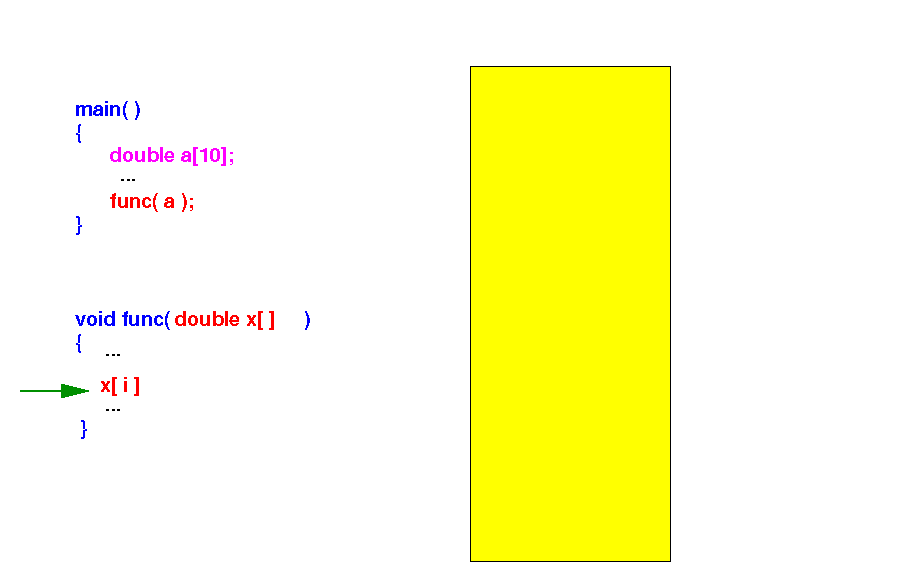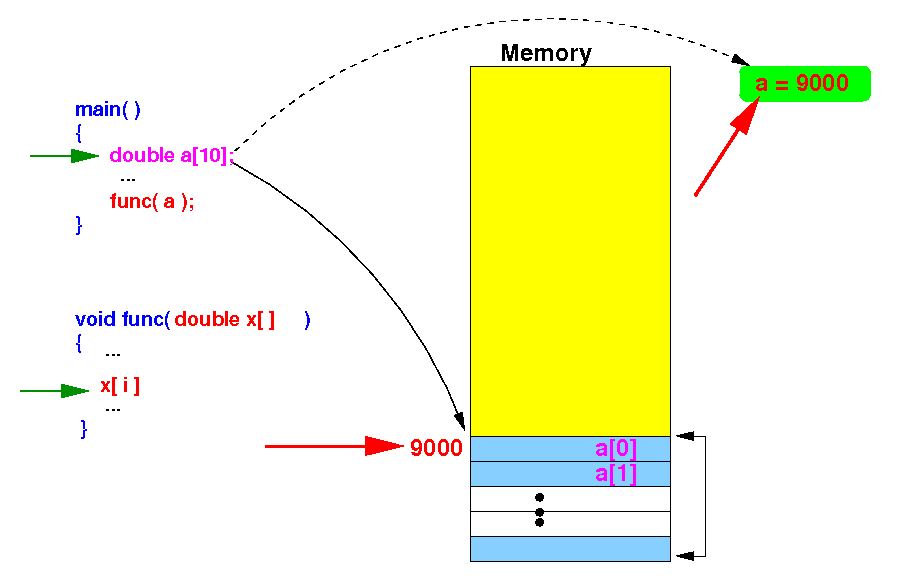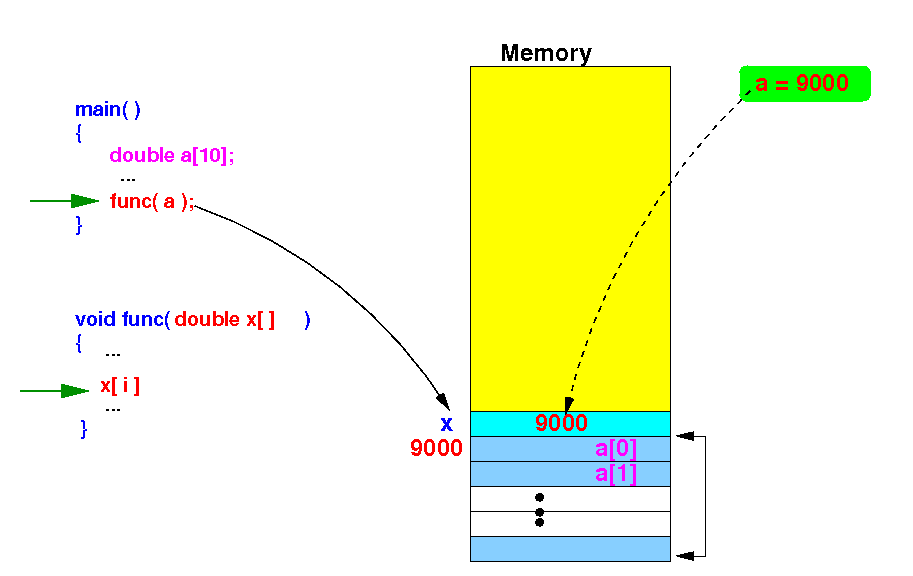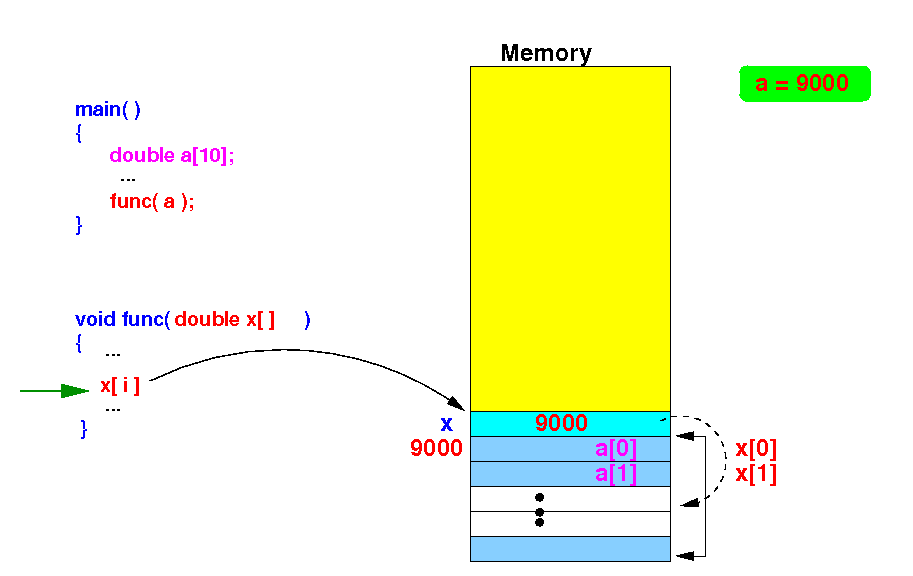Specifying
array variables as
parameters
- Syntax
to define an
array
parameter
to a function:
returnType funcName ( .. DataType arrayName[ ], ..)
{
// function body
}
|
- Example:
a function that
prints
the elements in
an array
void printArray( double x[ ], int n )
{
for ( int i = 0; i < n; i++ )
printf( "x[%d] = %lf\n", i, x[i] );
}
|
Note:
- Since
array variables
in C
does
not
array size information, we
must
pass the
array size n
as an (extra) parameter
|
|
Invoking a
function with
array variables as
parameters
- Syntax
to pass an array
as a parameter
of a function:
funcName ( .. arrayName, ..)
|
- Example:
calling the printArray
function with
an array a
#include <stdio.h>
int main( int argc, char* argv[] )
{
double a[10];
for ( int i = 0; i < 10; i++ )
a[i] = i;
printArray( a, 10 ); // Array size
}
|
Note:
-
we must
pass the
array size (=10)
in
as an
extra parameter
|
|
Alternative way to
define an
array parameter
DEMO:
demo/C/set1/array-param1.c
Declaring a function with
array parameter
-
Function declaration is
necessary when
a function is
defined
after it was
used:
int main( int argc, char* argv[] )
{
double a[10];
printArray( a, 10 ); // Use the printArray function
}
void printArray(double x[ ], int n) // Function defined after it was used
{
int i;
for ( i = 0; i < n; i++ )
printf( "x[%d] = %lf\n", i, x[i] );
}
|
|
Declaring a function with
array parameter
DEMO:
demo/C/set1/array-param1a.c
Arrays in C are
"passed-by-reference"
- Parameter passing mechanism
in C:
- C programs
always
use the
pass-by-value
parameter passing mechanism
|
-
However:
-
Some
expressions in
C returns
a
value of an
address
Example:
arrayName = address of the array variable
|
- When the value of
an address is
passed (= copied),
the
effect is
like pass-by-reference !
|
|
What happens when
an array is
passed as
an argument in
C
Consider
the following
program with
a function call with
an array
and parameter:

What happens when
an array is
passed as
an argument in
C
The array definition will
allocate memory to
store the
array elements:

The
array name
a is
equal to the
memory address (= reference)
where the array was
allocated !
What happens when
an array is
passed as
an argument in
C
The function call will
pass the
value of
the identifier a -
which is the
reference to
the array:

So the
effect of
passing an array is:
pass-by-reference !
What happens when
an array is
passed as
an argument in
C
When the array is
used inside
the function,
the expression
x[i] will
refer to
the element
a[i] in
main( ):

So the
effect of
passing an array is:
pass-by-reference !
Program that shows that
array parameters
are
"pass-by-reference"
(and can be modified)
void func( double x[ ] )
{
x[0] = 4444; // WIll change the ORIGINAL !!!
x[5] = 4444;
}
int main( int argc, char* argv[] )
{
double a[10];
int i;
for ( i = 0; i < 10; i++ )
a[i] = i;
printf( "Array before the function call:\n");
for ( i = 0; i < 10; i++ )
printf( "a[%d] = %lf\n", i, a[i] );
func( a ); // Pass array
printf( "\nArray AFTER the function call:\n");
for ( i = 0; i < 10; i++ )
printf( "a[%d] = %lf\n", i, a[i] );
}
|
DEMO:
demo/C/set1/array-param2.c
❮
❯



